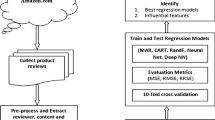Abstract
Online shopping is growing in popularity as internet services are used more frequently. Many consumers consider online shopping due to the comfort, ease of access, and variety of products offered. However, this wide variety of products makes it hard for consumers to select one product from many available options. It is infeasible for any customer to go through many customer reviews given to the products. Therefore, the customers’ star rating becomes a viable solution for the star rating assigned to the products. However, the star rating-based system takes the mean of star ratings given by all the consumers. The mean value represents the masses’ view but fails to represent personal views. In this work, a novel star ratings-based system is proposed for the products to reflect the consumer’s individual needs and expectations by extracting customer reviews. A recurrent neural network is used as a sequential prediction model to hold aspect words and identify them after tokenization of a detailed review. The proposed \(R^3N^2\) model enhances 0.9%, 2.5%, 4.9%, and 6.7% accuracy on digital products, electronics products, Kaggle movie reviews, and Apps datasets than the existing state-of-the-art (SOTA) models, respectively. Therefore, the proposed model outperforms SOTA models and may be used for real-time applications as it takes 2.56 ms per review.

Similar content being viewed by others
References
Akkaya C, Wiebe J, Mihalcea R (2009) Subjectivity word sense disambiguation. In: Proceedings of the 2009 conference on empirical methods in natural language processing, pp 190–199
Al-Natour S, Turetken O (2020) A comparative assessment of sentiment analysis and star ratings for consumer reviews. Int J Inf Manag 54:102132
Amplayo RK, Angelidis S, Lapata M (2021) Aspect-controllable opinion summarization. arXiv:2109.03171,
Bradley MM, Lang PJ (1999) Affective norms for English words (anew): instruction manual and affective ratings. Technical report, technical report C-1, the center for research in psychophysiology.
Cambria E, Olsher D, Rajagopal D (2014) Senticnet 3: a common and common-sense knowledge base for cognition-driven sentiment analysis. In: Twenty-eighth AAAI conference on artificial intelligence
Chen L, Xia M (2021) A context-aware recommendation approach based on feature selection. Appl Intell 51(2):865–875
Dataset Amazon (2018a) Reviews and rating of the Amazon products. http://jmcauley.ucsd.edu/data/amazon/. Accessed 9 July 2018
Dataset Kaggle (2018b) Reviews and Rating of the books and services. https://www.kaggle.com/c/sentiment-analysis-on-movie-reviews/data. Accessed 29 July 2018
Esuli A, Sebastiani F (2007) Sentiwordnet: a high-coverage lexical resource for opinion mining. Evaluation 17(1):26
Ganapathibhotla MLB (2008) Mining opinions in comparative sentences. In: Proceedings of the 22nd international conference on computational linguistics (Coling 2008), pp 241–248
Hu M, Liu B (2004) Mining and summarizing customer reviews. In: Proceedings of the tenth ACM SIGKDD international conference on Knowledge discovery and data mining, pp 168–177
Hutto C, Gilbert E (2014) Vader: a parsimonious rule-based model for sentiment analysis of social media text. Proceedings of the international AAAI conference on web and social media 8:216–225
Jindal N, Liu B (2006) Mining comparative sentences and relations. In: Aaai, vol 22, p 9
Kumar K, Kurhekar M (2017) Sentimentalizer: Docker container utility over cloud. In: 2017 ninth international conference on advances in pattern recognition (ICAPR). IEEE, pp 1–6
Kumar S, Kumar K (2018) LSRC: Lexicon star rating system over cloud. In: 2018 4th international conference on recent advances in information technology (RAIT). IEEE, pp 1–6
Liang S, Wei W, Mao X-L, Wang F, He Z (2022) Bisyn-gat+: bi-syntax aware graph attention network for aspect-based sentiment analysis. arXiv:2204.03117
Liang Y, Meng F, Zhang CY, Xu J, Zhou J (2020) An iterative multi-knowledge transfer network for aspect-based sentiment analysis. arXiv:2004.01935
Liu B (2012) Sentiment analysis and opinion mining. Synth Lect Hum Lang Technol 5(1):1–167
LIWC (2018) Dictionary based sentimental analysis. www.liwc.net. Accessed 19 July 2018
Marcacini RM, Rossi RG, Matsuno IP, Rezende SO (2018) Cross-domain aspect extraction for sentiment analysis: a transductive learning approach. Decis Support Syst 114:70–80
Mishra R, Kumar P, Bhasker B (2015) A web recommendation system considering sequential information. Decis Support Syst 75:1–10
Vijayvergia A, Kumar K (2018) Star: rating of reviews by exploiting variation in emotions using transfer learning framework. In: 2018 conference on information and communication technology (CICT). IEEE, pp 1–6
Vinagre J, Jorge AM, Rocha C, Gama J (2019) Statistically robust evaluation of stream-based recommender systems. IEEE Trans Knowl Data Eng 33(7):2971–2982
Von Helversen B, Abramczuk K, Kopeć W, Nielek R (2018) Influence of consumer reviews on online purchasing decisions in older and younger adults. Decis Support Syst 113:1–10
Wang D, Dengwei X, Dongjin Y, Guandong X (2021) Time-aware sequence model for next-item recommendation. Appl Intell 51(2):906–920
Zhang W, Deng Y, Li X, Yuan Y, Bing L, Lam W (2021) Aspect sentiment quad prediction as paraphrase generation. arXiv:2110.00796
Author information
Authors and Affiliations
Corresponding author
Additional information
Publisher's Note
Springer Nature remains neutral with regard to jurisdictional claims in published maps and institutional affiliations.
Rights and permissions
Springer Nature or its licensor holds exclusive rights to this article under a publishing agreement with the author(s) or other rightsholder(s); author self-archiving of the accepted manuscript version of this article is solely governed by the terms of such publishing agreement and applicable law.
About this article
Cite this article
Kumar, K. \(R^3N^2\): a novel approach for review based custom star rating using recurrent neural network. J Ambient Intell Human Comput 14, 9089–9097 (2023). https://doi.org/10.1007/s12652-022-04413-8
Received:
Accepted:
Published:
Issue Date:
DOI: https://doi.org/10.1007/s12652-022-04413-8




